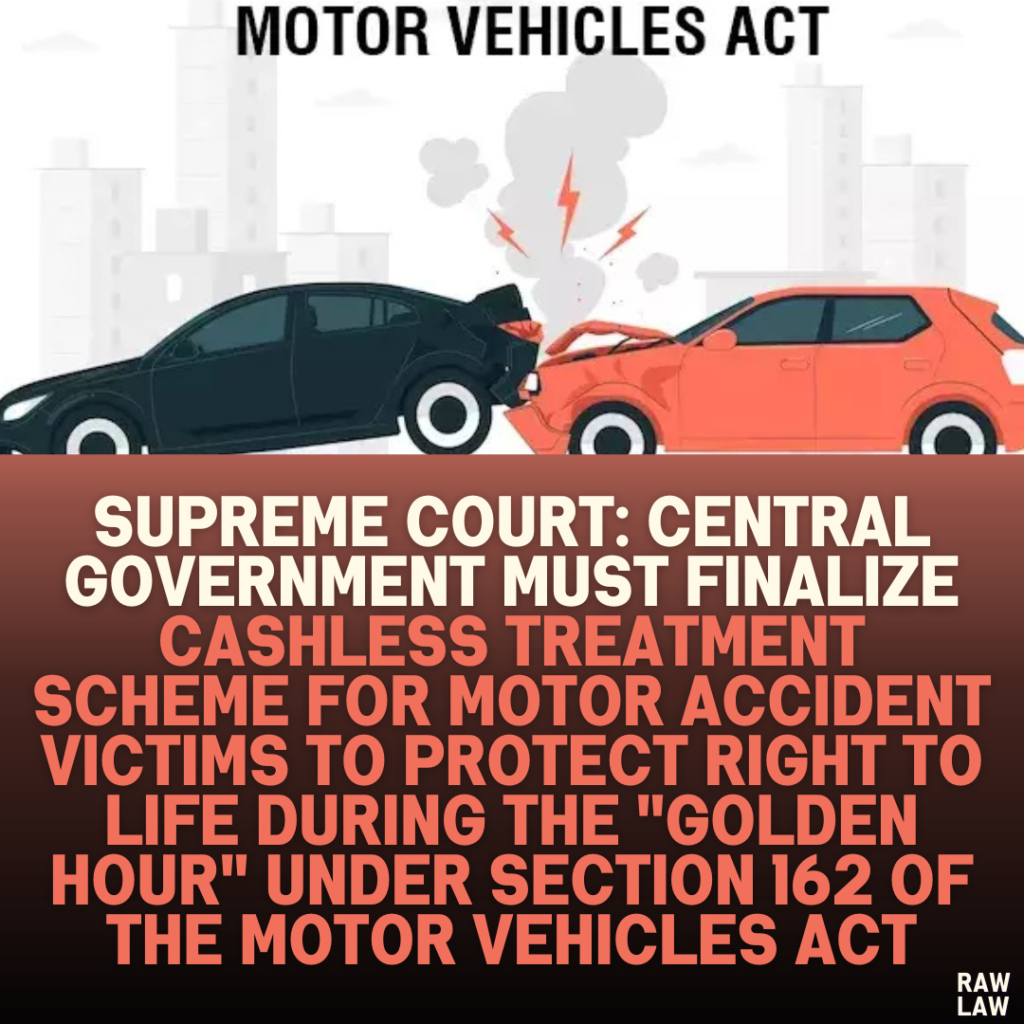Court’s Decision
The Supreme Court directed the Central Government to urgently frame and implement a scheme under Section 162 of the Motor Vehicles Act, 1988. The scheme should enable cashless treatment for victims during the “golden hour” and be finalized by March 14, 2025, with details of its implementation filed in an affidavit by March 21, 2025. The Court emphasized strict adherence to these timelines and stated, “No further time shall be granted.”
Key Sections of the Judgment
1. Facts
- The Motor Vehicles Act was amended in 2019, introducing Section 162 to provide for a scheme ensuring cashless treatment during the golden hour, defined as the critical first hour following a traumatic injury when timely medical intervention can save lives.
- Despite these legislative amendments, no such scheme had been implemented. A draft concept note prepared by the Ministry of Road Transport and Highways was placed on record in April 2024, but concerns about its adequacy were raised.
2. Issues
The Court addressed two main issues:
- Statutory Obligation: Did the Central Government fail to meet its legal duty under Section 162(2) of the Motor Vehicles Act to frame a scheme?
- Effectiveness of Draft Scheme: Could the draft concept note, which proposed limited treatment (7 days) and a cap on expenses (₹1,50,000), fulfill the objective of saving lives during the golden hour?
3. Petitioner’s Arguments
- The petitioner contended that the lack of a finalized scheme violated the fundamental right to life under Article 21 of the Constitution.
- They emphasized the urgent need for immediate medical aid for accident victims, irrespective of their financial status, to prevent avoidable fatalities.
4. Respondent’s Arguments
- The Central Government argued that it had made progress by drafting a concept note but acknowledged that the scheme had not yet been implemented.
- It cited challenges in determining funding mechanisms, treatment limits, and administrative procedures.
5. Analysis of the Law
- Section 162: This provision obligates the Central Government to create a scheme for cashless treatment during the golden hour, financed by insurance companies.
- Section 164-B: Establishes the Motor Vehicle Accident Fund, designed to support this scheme by providing insurance cover to road users and compensation for hit-and-run victims.
- The Court recognized that these legislative measures were intended to uphold the right to life and ensure timely medical care, which often determines the survival of accident victims.
6. Precedent Analysis
- The Court referenced its 1989 decision in Parmanand Katara v. Union of India, which emphasized the need for hospitals to prioritize life-saving medical care for accident victims without waiting for procedural formalities.
- The judgment laid the groundwork for recognizing the right to immediate medical aid as a component of the constitutional right to life.
7. Court’s Reasoning
- The Court expressed concern over the lack of urgency in implementing the scheme, observing:”The provision made in Section 162 seeks to uphold and protect the right to life guaranteed by Article 21 of the Constitution.”
- It underscored that the failure to frame the scheme over two years after the law’s enactment demonstrated a disregard for the lives of accident victims.
- The Court also noted deficiencies in the draft concept note, including a seven-day treatment limit and a ₹1,50,000 cap, stating that these constraints would undermine the objective of saving lives.
8. Conclusion
The Court issued the following directives:
- The Central Government must finalize the scheme by March 14, 2025, and submit an affidavit detailing its implementation by March 21, 2025.
- The General Insurance Council (GIC) was directed to streamline the claims process for hit-and-run victims and address document deficiencies in pending cases.
- The portal for claims processing must be operational at the earliest, with updates provided to the Court by March 14, 2025.
9. Implications
- Timely Medical Aid: The judgment reinforces the government’s constitutional and statutory duty to provide timely medical aid to accident victims, potentially reducing fatalities.
- Administrative Accountability: By setting strict deadlines, the Court aims to ensure compliance and eliminate bureaucratic delays.
- Public Awareness: The case highlights the importance of legislative measures like Section 162 in safeguarding the right to life.




Pingback: Delhi High Court Upholds Premature Retirement of CISF Personnel: "Service Record Portrays a Doleful Picture," Highlights Misconduct and Public Interest as Key Justifications Under Rule 48 of CCS Rules - Raw Law